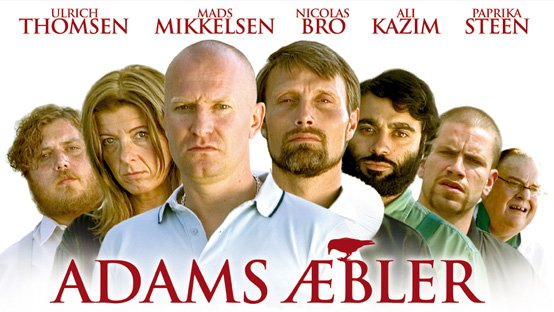
May 1, 2012, by Stephen Mumford
Moral Reflection and Danish Cinema
Films are capable of producing all variety of responses from their viewers. When they give us an insight into other people’s lives, real or fictional, they are particularly good at provoking empathy. Perhaps the immediacy of seeing someone’s face, be it only an actor, allows us to identify with the character and reflect on their experiences and perspectives. A good film can use this asset to stimulate moral reflection. Novels are also able to do this but the popular appeal of the medium, and an experience that fits into two hours or less, means that films have a powerful capacity to make us face moral challenges.
I’d like to offer as an example a wonderful Danish film from 2005, Adams Æbler (Adam’s Apples) by director Anders Thomas Jensen. The film stars Mads Mikkelsen as priest Ivan who takes into his community Adam (Ulrich Thomsen), a violent neo-Nazi released from prison. Adam is mystified by the priest’s kindness in the face of his own violence. But he later comes to regret exposing Ivan to the sad truth of the world and his own wretched life: a truth which Adam discovers after reading the Book of Job. This sounds somewhat heavy, and the themes are undoubtedly serious, but it’s also an extremely funny film amid a dose of brutality. Jensen also directed the equally rewarding Flickering Lights and The Green Butchers. Danish cinema is in good health.
Although there are many trashy and throwaway films, it is also a form that can reach artistic heights. There are still enough filmmakers who want to use the medium to challenge and stimulate us. Morality has always been a theme for which film is an ideal vehicle. Some of the deepest moral truths cannot be stated but perhaps they can be shown.
No comments yet, fill out a comment to be the first

Leave a Reply